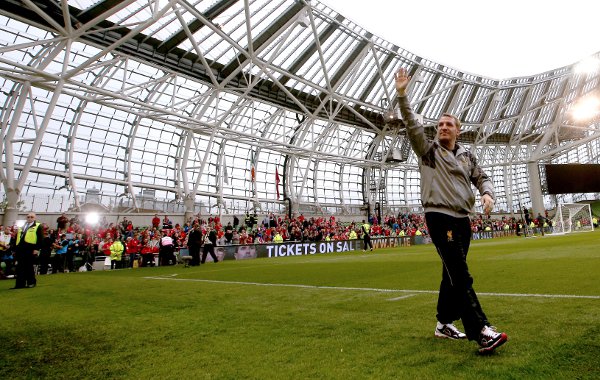THE queue spilled down the pavement and onto Lansdowne Road, five-deep with fans waiting to get in. On a bright May evening, big-time football had come to town. Yet so had some Big-Time-Charlies.
There were two faces to what I saw last Wednesday in the Aviva Stadium. There was the happy, smiley, excited expressions on two little boys, each holding their mother’s hand as they ran to keep pace with her speedy walk towards the ground. “Their first game,” she said, enjoying their enjoyment.
Inside the ground, there was a really pleasant atmosphere – a crowd of 42,000 supporters, most of them cheering for Liverpool, many of them families, seeing THEIR club visit their town.
And as PR exercises go, it was hard to think of anything simpler or cleverer. Send over a team and allow generations of fans to see their heroes in the flesh, thereby continuing the decades-old link between Liverpool and Ireland.
Yet it wasn’t the heroes they saw. Luis Suarez wasn’t there. Nor Steven Gerrard. It wasn’t a Liverpool first X1 – unless Joe Allen counts as a first-team player – which he was in just 15 of Liverpool’s 38 Premier League games this season.
So the mother of the five and six year old boys, who had spent close to €100 on tickets, was instead reading her programme and forced to point out Jordan Ibe and Brad Jones to the children. “Where’s Suarez?” she was asked.
There was no answer.
From Liverpool there was a clear answer. Their World Cup players were resting.
And after a long season – and with such an important tournament approaching, that was perfectly understandable.
The demands on a Premier League player who doubles up as an international are many. Their body needs time to rest and recover and playing Shamrock Rovers in a friendly three days after the Premier League season ends is bottom of the agenda, simply because the agenda is so packed.
And yet despite applying this logic, a sour taste travelled home with me last Wednesday.
The Liverpool players who were there played remarkably well. Ibe – an 18-year-old with just three first-team games for Liverpool under his belt – was sensational.
And there were four goals for their fans to cheer.
But those fans were still short-changed. In marketing the game – it was never made completely clear that Liverpool would field such a weakened side. The smarter fans would have guessed. But the mother of the two young boys? She only copped on when her money was spent and when her sons were demanding answers for Suarez’s absence.
 Brendan Rogers salutes Irish fans in the Aviva (Inpho)
Brendan Rogers salutes Irish fans in the Aviva (Inpho)Getting answers from Liverpool’s players afterwards was nearly as difficult. Most were rude and uncooperative and two of their former pros showed a different side to the chirpy, jovial image they give off on television.
Michael Owen was chatting with Jim Beglin in the Press room early that afternoon. A cleaner – going about his business – came into the room when he noticed Owen. Clearly nervous and a little star-struck, he performed a double-take before leaving the room.
Then, after plucking up some courage, he came back into the room and kept a long enough distance so that Owen would not have noticed his presence. As Beglin got up to move, the cleaner tentatively made his way over and walked past Owen before turning back and saying, ‘hello Michael’ as he held out his hand.
Owen – perhaps a little spooked by a stranger coming so close to him – didn’t shake it, instead continuing to take notepads out of his bag. If he said hello back to the cleaner, it was barely audible.
Later, after the game, a journalist asked Steve McManaman for a comment. Holding his phone to his ear, he said ‘sorry mate, I have to take this call’.
That was more than any reporter got last August when Liverpool came across to Dublin for the friendly against Celtic. Then every single player walked past the Press corps and refused to speak.
This time four players did chat. Yet it appeared to be a chore. “Gotta get on the team bus mate,” said Allen after 90 seconds of drivel.
The whole upshot of this is that the players don’t speak to the Press to solely satisfy our needs and justify our existence. We are the conduit between them and the fans.
They don’t have to like us – nor should they. But they should join up the dots. They are well paid and all receive big bucks because fans pay a lot of money to come to matches, subscribe to satellite television stations and buy club merchandise.
What the fans want in turn is to read the thoughts of the players they support in newspapers or else online. Otherwise newspapers wouldn’t get sold and websites wouldn’t get hits.
So what the 42,000 paying customers at the Aviva deserved last week was a pre-match press conference where Liverpool’s manager or players would speak – via the Press – to their Irish fans. They didn’t get that.
Nor did they get to see the strongest Liverpool team. And finally the post-match material provided to the fans, via the Press, was far from inspiring.
Does this matter? Liverpool, after a tremendous season, clearly have bigger fish to fry. They have a reputation for being a fans-friendly club and they don’t get that image by accident.
And so last Wednesday will go down as a day of two faces, one showing an excited child, the other a scowling professional.

